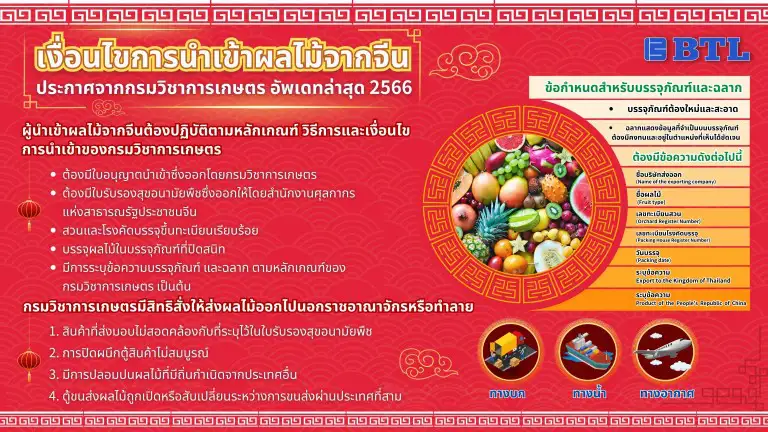2023 Chinese Fruit Import Regulations
July, 25 2023

To align with the agreements between Thailand and China and to reflect the current trade situation, the Director-General of the Department of Agriculture has issued the following conditions for importing fruits from the People's Republic of China:
Conditions for Importing Chinese Fruits
1. Import Permit
An import permit issued by the Department of Agriculture is required. Applications must be submitted through the Department’s electronic system.
2. Modes of Transportation
Fruits must be transported from China to Thailand using one of the following methods:
- By land via a third country
- By sea
- By air
3. Compliance with Regulations
Importers must comply with the regulations, methods, and conditions outlined in the Department of Agriculture’s announcements.
4. Phytosanitary Requirements
Imported fruits must be free from quarantine pests regulated by Thailand, live insects, soil, sand, and plant debris such as leaves, branches, weed seeds, and plant residues.
5. Orchard and Packing House Requirements
- Orchard Registration: Fruits must be sourced from orchards registered with China’s General Administration of Customs (GACC) or an officially recognized agency, and these orchards must also be registered with the Thai Department of Agriculture.
- Packing House Registration: Packing houses must be registered with China’s General Administration of Customs (GACC) or an officially recognized agency and must also be registered with the Thai Department of Agriculture.
6. Packaging and Labeling Requirements
- Packaging: Must be new and clean. If made from wood, it must comply with international phytosanitary standards.
- Labeling: Must be durable, waterproof, and clearly visible for inspection. Labels must be in English or Thai and include:
- Name of the exporting company
- Fruit type
- Orchard register number
- Packing house register number
- Packing date
- “Export to the Kingdom of Thailand”
- “Product of the People’s Republic of China”
- Transport Conditions:
- Land and sea shipments must be in fully sealed or temperature-controlled containers that must not be opened during transit.
- Air shipments must be in sealed packaging to prevent pest contamination.
- Land shipments through third countries must have intact seals from China’s General Administration of Customs until reaching the Thai border.
7. Phytosanitary Certification
- A phytosanitary certificate must be issued by China’s General Administration of Customs.
- For land shipments via third countries, the certificate is valid for ten days from the date of issuance.
- Specific certification text must be included depending on the transportation method and fruit type.
8. Import Inspection
- All imported fruits will undergo inspection upon arrival at the Thai border.
- Officials will verify all accompanying documents before conducting a physical inspection.
- Samples will be taken for pest analysis in a laboratory. If live pests are found, the fruits will be quarantined until further analysis is completed.
- If pests, contaminants, or other phytosanitary risks are detected, the shipment must be treated appropriately, re-exported, or destroyed at the importer’s expense.
- The Department of Agriculture reserves the right to reject and re-export or destroy shipments at the importer’s expense if:
- The shipment does not match the phytosanitary certificate.
- Container seals are not intact.
- The shipment contains fruits of non-Chinese origin.
- The container was opened or tampered with during transit through a third country.